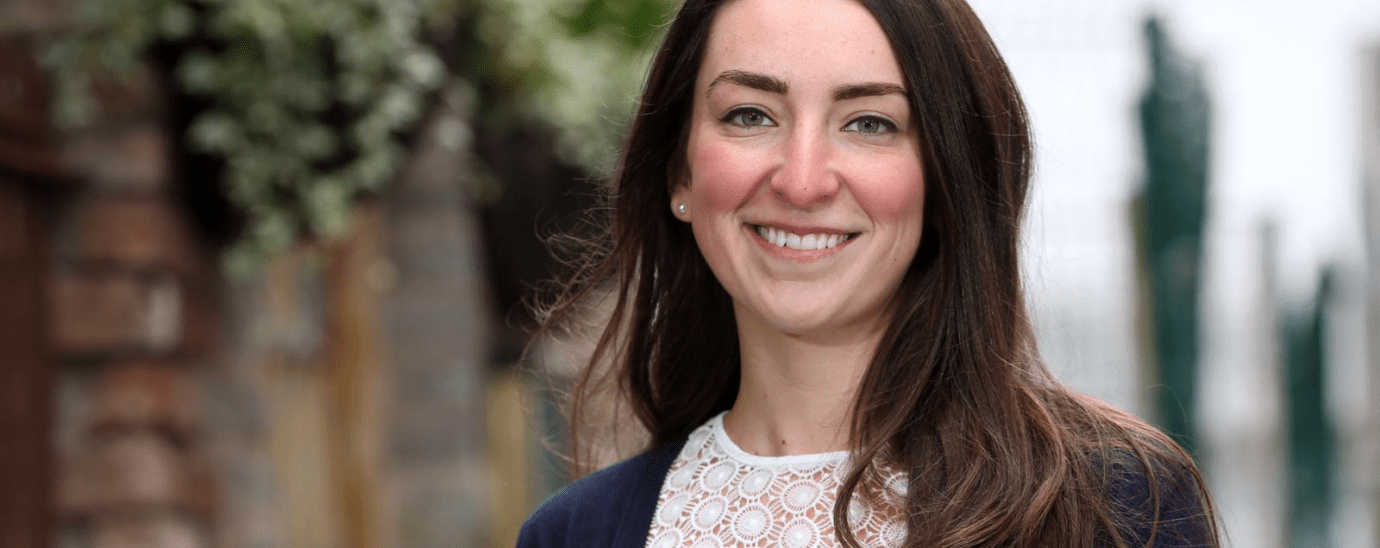Founder Feature: Becca Hume, Founder of TapSOS

In this week’s Founder Feature, we’ve partnered with the Super Connect for Good Competition powered by Empact Ventures and Hays. We are talking to the Founder of TapSOS, Becca Hume, who last month was announced as the competition’s Regional Winner for Northern Ireland and came second in the national final
TapSOS is a smartphone app that allows people to contact emergency services in a non-verbal manner. Its Founder, Becca Hume, graduated from Ulster University in 2015 with a Masters in Multidisciplinary Design and has completed British Sign Language Level 6. Becca is curious about users, behaviours and needs in order to design functional products for accessibility. Becca is a ‘Global Shaper’, an initiative of the World Economic Forum to establish a network of under 30s working together to address regional and global challenges and to play an active role in shaping policy, innovation, health, education and more.
Read more about TapSOS and Becca’s founder journey in the interview below.
Q: Could you tell us about your company and what you’re striving to achieve?
TapSOS is a smartphone app for non-verbal contact with emergency services (999).

Our technology, TapSOS has been in development since 2016. It is the first UK smartphone app to receive full accreditation and approval from the Department for Digital, Culture, Media and Sport (DCMS) for integration with BT 999. For four years we have worked diligently to develop our technology while complying with Government and Emergency Service regulations. TapSOS was originally designed for Deaf and Hard of Hearing to non-verbally contact 999, however it will benefit anyone unable to telephone due to physical, medical or situational barriers.
We exist because we want to see greater accessibility and inclusion for all when contacting 999. Our solution will empower those with vulnerabilities and disabilities to get the help they require. It is vital everyone can access help when needed and feel safe and protected.
Q: What made you decide to take on the challenge of founding your business?
At the age of 16, I had a part-time job in retail. It was here that I noticed a ‘problem’ and made it my aim to find a solution.
I had a Deaf colleague, which led me to studying British Sign Language for 8 years in night classes (qualifying with Level 6). I was totally fascinated by the language and loved the culture and Deaf community. It was through these relationships that ultimately lead to my exploration of 999 and its poor functionality for Deaf.
I went on to studying design at University and tied these curiosities together; I’ve always been curious of people, their behaviors and needs – and I begin to explore day-to-day activities in order to design functional products that are accessible and usable by a wide range of audiences. My passion for inclusive design begin.
I hadn’t set out to ‘create a business’; I simply wanted to help reduce barriers. Fast forward 4 years and we have ambitious plans to ensure we can remain sustainable, and keep delivering our service.
Q: Who are you and what is your story?
My name is Becca Hume; I’m a 30 year old compassionate entrepreneur, driven by injustice and inequality. I started on this entrepreneurial journey just after I finished studying a degree… it wasn’t intentional, and it hasn’t been easy but I’ve enjoyed every moment.
Compassion hasn’t only been important in my career, but also my personal life.
I became Northern Ireland’s youngest foster carer for the Belfast Health and Social Care Trust at the age of 27, after feeling compelled to act, having witnessed a great need and challenge within my own community.
My motivation comes from knowing I can help make an impact for societal good. I have developed the ability to feel quite comfortable in difficult circumstances, I’m not afraid to respond to crises or challenges. This didn’t come natural to me, but has been developed over time.
I’ve also grown passionate about females being represented in the tech industry and I would be thrilled to become a role model for younger females to show there are creative and innovative career paths.
Q: What was it like taking part in the Super Connect for Good Competition? Have the super connections before and after helped you?
Taking part in the Super Connect for Good Competition was fantastic – the whole event from start to finish was managed and delivered to a very high standard. To be recognised in a national competition was great exposure for us, we appreciated getting the opportunity to share our story. I still have daily emails from the Super Connect team who have worked tirelessly making introductions and offering continued support. I’ve since had a few further event invites and meetings with Hays and Cork Institute of Technology. If the competition runs in 2021, I’d highly recommend it to any startup.
Q: What keeps you up at night/what are you paranoid about?
Until 2020 I’ve never had a problem sleeping, regardless of the stress or pressures I’d usually be out like a light. This year has looked a little different, and like many others I’ve found it hard to switch off. Financial pressure has brought the most disruption to my sleep – for months during the lockdowns and restrictions, I have lay awake trying to figure out our runway, where we can reduce outgoing, and how to attract more investment to support our upcoming plans.
It has been a tough year, but one filled with lots of opportunity.
Read More: Founder Feature: Tarryn Gorre, CEO and co-founder of Kafoodle
Q: How many hours of sleep do you get and what is your morning/evening routine?
I need my sleep – I’d usually get around 8hrs per night, but if I can get 10hrs that would be ideal.
My routine changes a lot, I have gone through periods of waking at 4.30am to be at the gym for 5am where I get to spend some time by myself to clear the head. I’m most productive if I wake early – I like reaching 10am and feeling that my day is almost complete.
In contrast there could be days where I work late into the evening, and there would be no chance of a 4.30am alarm.
Q: What are your goals over the next 1, 3, 6 and 12 months?
We are currently one month into a new project – we are developing a piece of tech in response to the rise of Domestic Abuse, as a result of COVID. This piece of work will be complete in April.
We also have a new TapSOS release on the way, which will bring a nicer user experience while using the app. This new release has been live tested in the Republic of Ireland, connecting into BT’s 112 emergency system. We hope to go live in the South of Ireland early 2021.

Banner for TapSOS.
Q: Do you see this as UK centric or will you conquer the world by going global?
The need for this service is not confined to the UK, while TapSOS is only available in the UK at the moment, it has the potential to serve many people across many cultures and regions. We have plans to expand into new regions within Europe, Australia and America.
The app is prominently icon based – we spent many months ensuring these icons are universal, and easily understood. This is a real strength to our product.
Q: What’s one piece of advice you’d give to budding innovators taking the same journey?
Stick with it.
The entrepreneurial journey is not an easy one. I’ve been in this space almost 5 years now and I’ve seen so many great ideas and businesses fade out because the leader has stopped.
There are so many obstacles that get in the way, to the point where you question what you do. It’s so important to push through them, and keep the focus on your end goal.
Learn more about Becca Hume and TapSOS here: www.tapsos.com